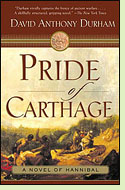Pride of Carthage
by David Anthony Durham
Reviewed by David Maclaine

Pride of Carthage benefits from the high-level skills David Anthony Durham brings to the historical novel from his conventional “literary” background. The novel covers the full sweep of the long Second Punic War, from its beginning with Hannibal's decision to capture a city in Spain that claimed alliance with Rome, to the final confrontation at Zama between the great Carthaginian general and the latest general Rome had sent against him, Publius Cornelius Scipio. Durham tells the story from the viewpoint of an assortment of characters, including the major combatants as well as Hannibal's wife and sister, a cavalryman from a nation allied to Carthage and a camp follower of the army that invades Italy. The scene shifts back and forth with the action, from Spain, to the coast of Gaul, to Italy and to Africa. It's a big, multi-layered story, and Durham captures it all.
Pride of Carthage succeeds because the author has the literary novelist's great gift of bringing character to life. Readers can easily follow the shifts of perspective from the bloody aftermath of a battle in Italy, to the tension of the women waiting back in Carthage, and then to the mounting uncertainty of a general who begins to suspect that he's been outmaneuvered, because each time the viewpoint changes Durham places us in the mind of a distinct, acutely sketched personality. His descriptive skill is also of the highest order, and his mastery of emotional shading aptly tracks the mounting tragedy of a long, bloody war. This is a novel about ancient times told with the immediacy that make it feel far more real than most of the stories of violent death that blare in the daily news. (2005, 592 pages)
More about Pride of Carthage at Powell's Books, Amazon.comPride of Carthage appears on the list of The 50 Best Historical Novels for a Survey of Ancient Roman History
Other novels set in ancient Carthage:
Salammbo by Gustave Flaubert (1862), about a mercenary soldier who falls in love with the daughter of Hamilcar Barca. See review or more info at Powell's Books
The Coin of Carthage by Bryher (1963), about ordinary people struggling to survive amid the Second Punic War. More info
Hannibal by Ross Leckie (1996), about the great Carthaginian general and his challenge to Rome. More info
Nonfiction about ancient Carthage:
The Carthaginians by Dexter Hoyos (2010). More info
Carthage Must Be Destroyed: The Rise and Fall of an Ancient Civilization by Richard Miles (2011). More info
The Fall of Carthage by Adrian Keith Goldsworthy (2007). More info
Online:
Carthage at the Ancient History Encyclopedia
Back to Novels of Ancient History
Back to Directory of Book Reviews